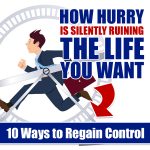
Consistently making good decisions is not easy.
As a student of decision making, I have discovered LOTS of reasons you and I make lousy, or shall we say “less than optimum” decisions. I have undoubtedly experienced all of them many times over. You have, too.
There is one reason we need to talk about that is extremely frustrating to deal with… especially when others around you do it. So much so, that you are tempted to utter an F word.
This cause of poor decision making is also a 4-letter F word… FEAR.
If not addressed, fear will not only affect your decisions today but will also reduce your ability to improve your decision-making abilities in the future. Not good.
The Hidden Decision-Making Minefield
 There are many reasons your decision making is not always good… and often downright bad. Two of them are really hard to see.
There are many reasons your decision making is not always good… and often downright bad. Two of them are really hard to see.
1. Using a flawed decision-making process. Research has shown that most of us make decisions using the wrong framework. It is like trying to determine the correct decibel level of a certain sound… using a telescope.
You can read all about this flawed approach… and how to solve it by clicking here.
2. Decisions Based on Distorted Perceptions. The decisions we make are only as good as the reliability of the “facts” upon which they are based.
For example, you decide not to bring your umbrella to an outdoor event because you look out you east window and the “fact” that you see sunshine makes that a seemingly good decision.
Unfortunately, if you had looked out the west window you would see the true “facts” clearly… dark clouds looming. Every day you make seemingly good decisions based on wrong perceptions.
Research has demonstrated how our perceptions of “facts” are distorted in hundreds of ways. You can read more about these distortions (and how to counteract them) by going here, here and here.
There are other factors impacting your decision making that are MUCH more obvious.
Fear is one of them.
3 Ways Fear Impacts Your Decision Making Abilities
In my humble opinion, fear is one of the chief culprits to a miserable life. In decision making in particular, it corrupts your approach to and the results of your decisions in at least three ways.
1. Causing You to Overthink a Decision.
There are some people who are like the old Lexus slogan: “In the relentless pursuit of perfection.”
People like Larry. He is trying to make sure his life turns out perfect. As a result, he anxiously tries to pick the perfect career, the perfect city in which to move to, and that perfect someone who will make his life, well, perfect!
People like Larry overthink many decisions because they are afraid of making “the wrong decision.” As a result of this fear, they put waaaay too much pressure on themselves to make the perfect decision, and to look at the situation from every conceivable angle.
Don’t get me wrong. I am big believer in carefully and deliberately evaluating a situation and trying to make the best possible decision. Side comment: just be aware there are certain situations in which a very deliberate approach is the worst possible way to make a decision.Learn more about those situations here.
The problem with overthinking a decision
The problem with Larry is that because of his fear of making a mistake (and putting a ton of pressure on himself), he often experiences paralysis analysis.
“Hey, Larry! What did you decide to do about that situation?” Oh… umm, I’m still evaluating my options.
The overthinker is afraid of making the “wrong” (regrettable) decision based on variables they can’t possibly know.
“I am looking at other job possibilities because I don’t like my current job.
But, what if I take a different job and I don’t like it, too… but then the economy tanks and I can’t find another job? Or the company has financial problems and I get laid off?
Or fill in the blank (with other real or imagined scenarios).”
The reality of your situation
Listen, you can’t control, predict or guarantee the future. You can’t see every possible factor that influences an outcome, or every variable that may occur in the future.
There is one thing I can guarantee: at some point, likely many times, you WILL make a less than optimum decision (because you are not all seeing, all knowing, all wise… only God is).
But guess what? You’ll be ok, even if you aren’t experiencing your perfect world (which BTW doesn’t exist). Plus, there often are multiple good options. Don’t sweat it out over the one option that is “perfect” when there are actually several “excellent” options.
So, relax… and make a decision. You have ENOUGH information… now make a decision.
I like Dave Ramsey’s philosophy toward the fear of making the “wrong” decision:
“I make my decision. Then, if things don’t turn out like I thought, I make another decision.”
My advice for the Larry’s of the world: Stop overthinking every decision… it’ll be ok. Really.
2. Putting Off Your Decision
Sometimes the fear of making the “wrong” decision leads you to procrastinating on a decision.
Once again, there is wisdom in not making a hasty or impulsive decision. Giving yourself a little time and distance can help clarify things.
But, that is not what I am talking about here.
The putting off of a decision often is the product of fear. The thinking is that as long as you don’t decide, you are protecting yourself from making a bad decision.
Wrong. Not making a decision IS a decision.
It is not unusual for an option or two to disappear entirely because you put off the decision. By not deciding, you by default have decided… and even lost some of your possible options. That’s bad.
Making easier decisions harder
In addition, by putting off a decision you often make a relatively easy decision more difficult.
For example, by not deciding on how to deal with a problem employee, the issues don’t go away… but get bigger and often more complex.
Warren Buffet’s business partner Charlie Munger once observed:
“The difference between a good business and a bad business is that good businesses make one easy decision after another. The bad businesses make painful decisions time after time.”
In other words, make decisions when they need to be made, in the earlier stages when they are easier and haven’t turned into big, often painful decisions.
3. Short-Term Fear = Long-Term Problems
When you let fear of making the wrong decision have its way, it can impact your ability to make good decisions FAR INTO THE FUTURE.
Why?
Because decision making has a dimension of skill to it. The more you do it (and do it correctly), the better you get at it. On the flip side, if you habitually put off or delay your decisions, you end up making fewer decisions. Your decision muscles don’t grow… and you never get better at it.
If you want to consistently make better decisions, then make decisions early and often. Don’t let fear keep you from developing these muscles.
Research has shown (not just in making decisions, but in all of life): Not being afraid to make a mistake is one of the keys to a better, more successful life.
To Summarize:
- Fear can lead us to overthink a decision, factoring in variables you have no way to predict. This can lead to analysis paralysis and often crazy decisions.
- Fear can cause us to put off or avoid some decisions, which often results in lost options and worse decisions, not better.
- Fear can reduce the number of decisions you make so that over time your decision-making abilities do not improve. Every decision is unnecessarily hard and often comes with poor results.
Other resources you can check out-
- How to Balance the Fear of Failure with the Prospect of Regret by Jon Acuff
- How to Stop Getting Paralyzed and Start Making Better Decisions by Jeff Goins
Your Turn!
How has fear hindered your ability to make a good decision? Leave a comment below.









Please note: I reserve the right to delete comments that are offensive or off-topic.